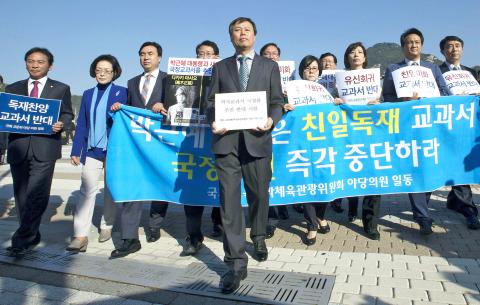Hundreds of South Korean academics have declared they are boycotting the writing of state-issued history textbooks out of concern that they will contain distorted views on the country’s recent history.
South Korean President Park Geun-hye’s government plans to require middle and high schools to use textbooks edited by the government after 2017, instead of allowing schools to choose from eight private publishers, as is currently the case.
South Korea’s move toward state-issued textbooks is the latest in a series of efforts by conservative leaders in Seoul and Tokyo to shape school history books to reflect their political views, and has sparked fierce criticism from academics and opposition parties.

Photo: EPA
Professors from more than 20 South Korean universities said they would not contribute to the textbooks because they believe the government is moving to soften descriptions of South Korea’s brutal dictatorships that preceded a bloody transition toward democracy in the 1980s.
The Korean History Research Association, the country’s largest group of historians with nearly 800 members, has declared it will not participate in the writing process.
Opposition leader Moon Jae-in, who lost the 2002 presidential election to Park, said in a Facebook post yesterday that the directive to revert to state-issued textbooks signals an attempt at “beautifying” past dictatorships, and added that such textbooks would be “global embarrassments.”
In announcing the controversial plans on Monday last week, South Korean Education Minister Hwang Woo-yea said that the current history textbooks are too left-leaning and encourage views sympathetic to North Korea and urged for the need of school books that were “objective” and “balanced.”
The plan was to recruit professional historians to help write the new textbooks.
Lee Shincheol, a historian at Seoul’s Sungkyunkwan University and a contributing author of one of the current textbooks, said that the government’s criticism makes little sense because private publishers had been required to follow editorial guidelines set by the South Korean Ministry of Education, Science and Technology and have their content reviewed by a state-run history institution.
For the government to insist on full control over textbooks would eliminate academic freedom and result in politicized historical narratives, Lee said.
“Even Korea’s feudal monarchs had granted autonomy to royal chroniclers, but Park’s concept of history is more outdated than that of old kings,” he said.
Park defended the move toward state-issued textbooks by saying history classes must inspire “pride” in students for being South Korean citizens.

PRECARIOUS RELATIONS: Commentators in Saudi Arabia accuse the UAE of growing too bold, backing forces at odds with Saudi interests in various conflicts A Saudi Arabian media campaign targeting the United Arab Emirates (UAE) has deepened the Gulf’s worst row in years, stoking fears of a damaging fall-out in the financial heart of the Middle East. Fiery accusations of rights abuses and betrayal have circulated for weeks in state-run and social media after a brief conflict in Yemen, where Saudi airstrikes quelled an offensive by UAE-backed separatists. The United Arab Emirates is “investing in chaos and supporting secessionists” from Libya to Yemen and the Horn of Africa, Saudi Arabia’s al-Ekhbariya TV charged in a report this week. Such invective has been unheard of

US President Donald Trump on Saturday warned Canada that if it concludes a trade deal with China, he would impose a 100 percent tariff on all goods coming over the border. Relations between the US and its northern neighbor have been rocky since Trump returned to the White House a year ago, with spats over trade and Canadian Prime Minister Mark Carney decrying a “rupture” in the US-led global order. During a visit to Beijing earlier this month, Carney hailed a “new strategic partnership” with China that resulted in a “preliminary, but landmark trade agreement” to reduce tariffs — but

Chinese President Xi Jinping’s (習近平) purge of his most senior general is driven by his effort to both secure “total control” of his military and root out corruption, US Ambassador to China David Perdue said told Bloomberg Television yesterday. The probe into Zhang Youxia (張又俠), Xi’s second-in-command, announced over the weekend, is a “major development,” Perdue said, citing the family connections the vice chair of China’s apex military commission has with Xi. Chinese authorities said Zhang was being investigated for suspected serious discipline and law violations, without disclosing further details. “I take him at his word that there’s a corruption effort under

China executed 11 people linked to Myanmar criminal gangs, including “key members” of telecom scam operations, state media reported yesterday, as Beijing toughens its response to the sprawling, transnational industry. Fraud compounds where scammers lure Internet users into fake romantic relationships and cryptocurrency investments have flourished across Southeast Asia, including in Myanmar. Initially largely targeting Chinese speakers, the criminal groups behind the compounds have expanded operations into multiple languages to steal from victims around the world. Those conducting the scams are sometimes willing con artists, and other times trafficked foreign nationals forced to work. In the past few years, Beijing has stepped up cooperation